• Messe Berlin is building one of Germany’s largest rooftop photovoltaic arrays and focusing on climate-friendly air-conditioning and heating systems
Sustainability continues to be one of the key topics at InnoTrans. From 24 to 27 September 2024, exhibitors are presenting sustainable solutions at the leading international trade show for transport technology. Products range from carbon-neutral transport and resource-efficient interiors to splicing connectors using recycled plastic.
Siemens Mobility presents sustainable mobility solutions
At InnoTrans, in a dedicated area on its stand in Hall 27, Siemens Mobility is showing how the company is helping its customers to normalise carbon-neutral passenger and freight transport, whether door to door, in cities or elsewhere: with rolling stock, infrastructural, intermodal and turnkey solutions and attendant services. Siemens Mobility uses resource-efficient methods, energy-efficient products and is driving the development of alternative drive systems with battery and hydrogen technology. Customers benefit from the increase in their systems’ value due to a lifecycle management strategy, which in turn reduces their company’s carbon footprint. These are among the solutions Siemens Mobility is presenting at InnoTrans 2024.
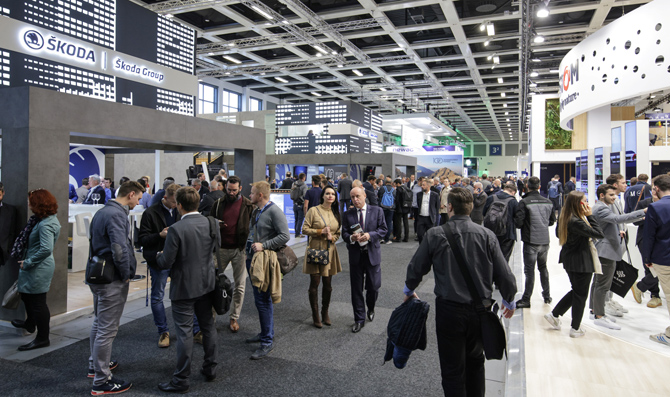
Alstom: all new products to be eco-friendly designs by 2025
Alstom is also developing solutions necessary for reducing the carbon footprint of transport. The company subscribes to a lifecycle management strategy for reducing its environmental impact by taking an eco-friendly design approach. According to Alstom, 65 per cent of its latest solutions were eco-friendly last year, and this is to apply to all new products by 2025. Alstom focuses on innovations aimed at reducing energy consumption, by designing more efficient traction systems, improving aerodynamics and developing modern driving assistance systems. A large number of alternative solutions are required for diesel engines to ensure that mobility becomes more sustainable. Alstom was the first rail transport company commercially operating hydrogen and battery-electric trains. In Hall 3.2 the company is displaying a wide range of low-emissions rail technology for individual customer needs.
Vossloh: rail sections as part of the overall system
According to Vossloh, viewing rail sections as part of the overall system is pivotal to driving the mobility transformation in the context of rail infrastructure. This 360-degree approach is part of Vossloh’s DNA. “Backed by around 140 years of successful experience and forward-looking system solutions, Vossloh AG optimises customers’ infrastructure, maximises railway availability and contributes to sustainable mobility worldwide.“ The company is exhibiting in Hall 26.
SPITZKE reduces CO₂ emissions
As a company serving the rail infrastructure industry, in Hall 5.2 SPITZKE is shaping future mobility based on sustainability and helping to meet climate targets. With regard to the environment, the group’s main focus is on responsible resource management including electricity and diesel and on reducing CO₂ emissions. The emphasis is also on social aspects such as employee health and safety, training the next generation, and responsibility towards society.
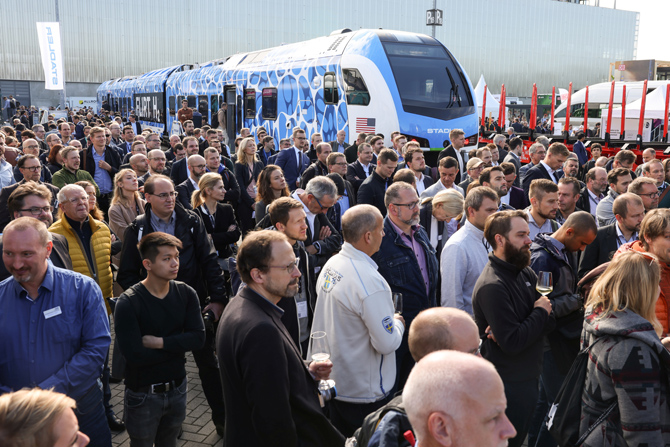
Lantal Textiles: resource-efficient textiles and floor coverings
In Hall 1.1, manufacturers including Lantal Textiles are displaying eco-friendly products for interiors. “We have designed several new products which consume significantly less material and water and produce a smaller carbon footprint, ranging from digitally dyed seat covers and floor coverings to recycled waste from our own production facilities“, says Stefan Wilhelm, head of the Ground department.
WAGO: splicing connectors with an eco-friendly lever
According to WAGO, even tiny things can make a positive contribution to the environment. The connector and automated systems supplier has made improvements to its 221 Series. With its Green Range levers it incorporates certified-source and organically derived recycled plastic, which saves fossil resources and keeps plastic circulating in production. WAGO is occupying all of Hall 13 at InnoTrans.
Swissrail: first carbon-neutral national stand at InnoTrans
Exhibitors are also making a positive contribution to the climate by reducing their carbon footprint at the fair. Swissrail (halls 2.2 and 26) showed the way forward. In 2022 Switzerland was represented on a carbon-neutral stand at InnoTrans. 47 Swiss companies took part in the groundbreaking project. Despite measures to reduce the carbon footprint, participation in the event generated the equivalent of 431 tonnes of CO₂. In order to take responsibility for its emissions, Swissrail supported reforestation measures in Switzerland and invested in wind power in India, an important export market where rail electrification is gathering pace. In 2024, Swissrail is again planning to make a positive contribution to the climate at InnoTrans, and wherever possible will take sensible steps to reduce emissions and support climate action projects with its partner Swiss Climate. The majority of emissions are caused by stand employees and visitors travelling to and from the fair, one-third of whom already arrived by rail in 2022. In order to increase those numbers, a joint rail trip with 60 people is being organised for 2024.
Messe Berlin continues to push for more sustainability
Messe Berlin continues to reduce the company’s carbon footprint and that of its in-house events. In order to achieve this, Messe Berlin has introduced systematic sustainability management and is working on a group-wide sustainability strategy which takes the ecological, economic and social aspects of sustainability into account.
Mobility: eco-friendly travel to and from the fair
In order to support eco-friendly travel to and from in-house events, Messe Berlin is promoting a DB event ticket. With an InnoTrans ticket, holders can also use Berlin public transport in zones A, B and C free of charge for as long as the ticket is valid.
Networked transport is what visitors can already experience on their way to the Berlin Exhibition Grounds, with Messe Berlin supporting an intermodal mobility concept over the last mile to the fair. Five Jelbi docking stations are provided on the exhibition grounds, where users can park their rented bicycles and scooters. These can be used for quick and emissions-free trips to S-Bahn or railway stations and to the city centre of Berlin.
Energy: Berlin’s largest photovoltaics array under construction on the hall rooftops
Messe Berlin subscribes to a sustainable energy concept in order to reduce energy consumption and CO₂ emissions. Berlin’s largest rooftop photovoltaics array, one of the three largest in Germany, is currently under construction on 20 of the 26 halls and due to be completed in late 2024. Around 20,000 solar panels are being installed on an area totalling 50,000 m². In future, Messe Berlin’s rooftop photovoltaics system will generate around 7.3 GWh of green electricity, roughly equivalent to the annual consumption of 4,000 private households. Messe Berlin will consume around 80 per cent of the electricity itself, with surplus energy being fed into the Berlin power grid. The photovoltaics system will reduce annual CO₂ emissions by 2,900 tonnes. At the same time, Messe Berlin’s entire air-conditioning and heating systems are being converted to eco-friendly sustainable technology. In future, more environmentally friendly heating methods and improved air-conditioning will reduce annual CO₂ emissions by around 5,400 tonnes and significantly lower operating costs.
Waste management: reduce, re-use, recycle
Whether packaging, construction material or food waste – it is not possible to avoid waste at trade shows and congresses. By implementing innovative concepts Messe Berlin is gradually minimising the amount of waste at events, for example by reusing materials and processing useful materials. Messe Berlin is also cooperating with the Berliner Senate Department for the Environment, Mobility, Consumer Affairs and Climate Action on the ReUse Berlin zero waste initiative in order to further recycling of stand construction materials.
About InnoTrans
InnoTrans is the world’s leading trade show for transport technology and takes place every two years in Berlin. The five segments at InnoTrans comprise Railway Technology, Railway Infrastructure, Public Transport, Interiors and Tunnel Construction. InnoTrans is organised by Messe Berlin GmbH. In 2022, 2,771 exhibitors from 56 countries exhibited their products and services to 132,319 trade visitors from 137 countries. 128 vehicles and 14 buses were shown on the outdoor display site and Bus Display. The next InnoTrans will take place on the Berlin Exhibition Grounds from 24 to 27 September 2024.





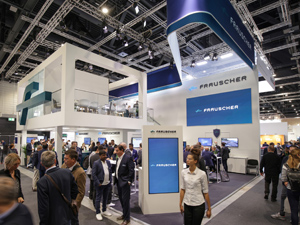
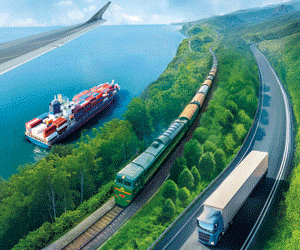

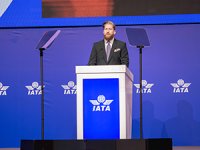





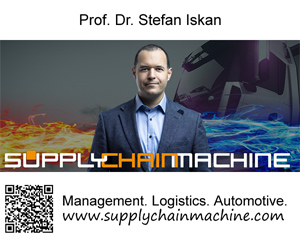
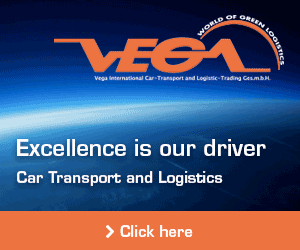
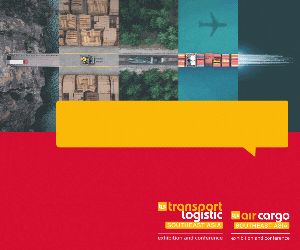
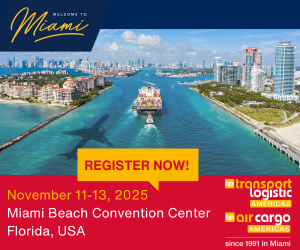


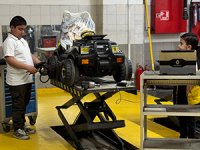





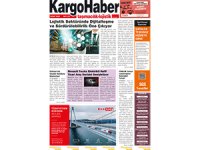

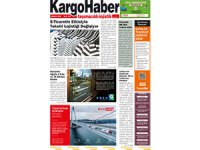
Türkçe karakter kullanılmayan ve büyük harflerle yazılmış yorumlar onaylanmamaktadır.